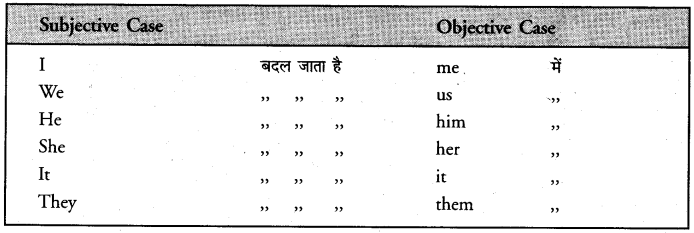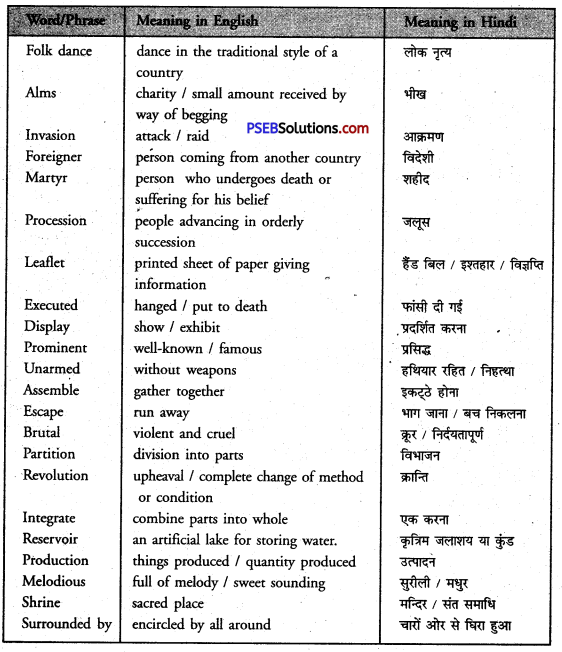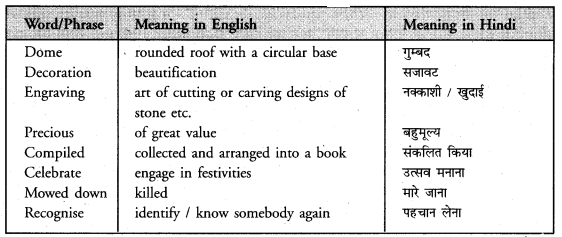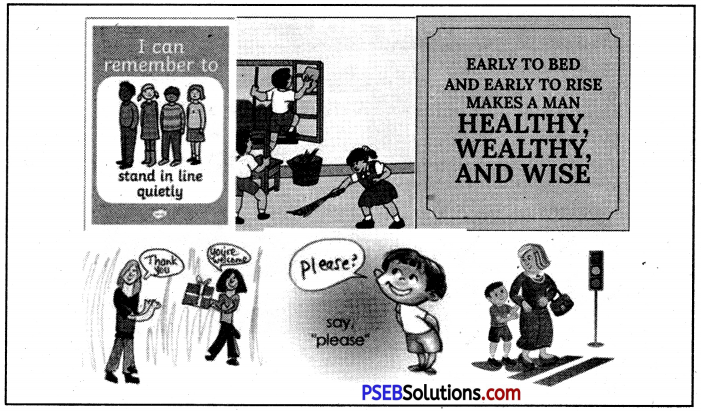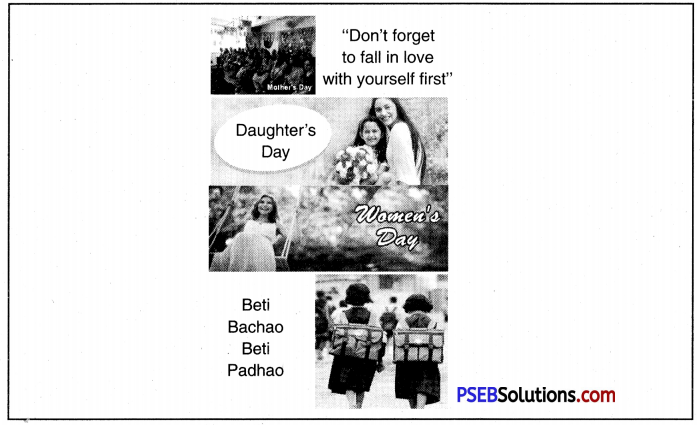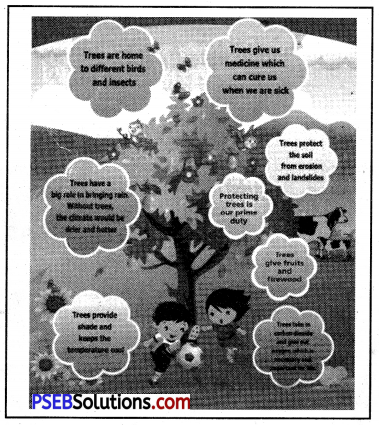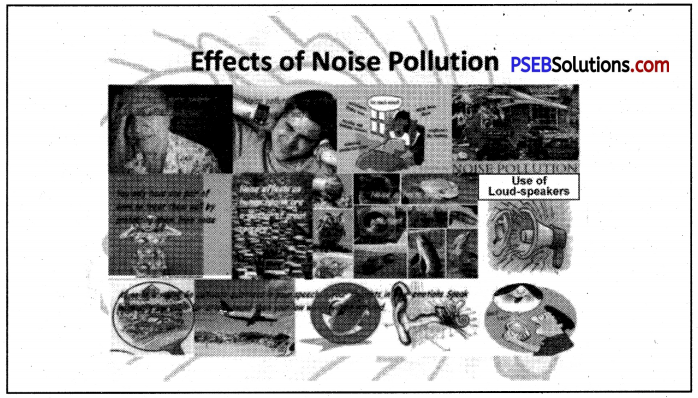Punjab State Board PSEB 8th Class English Book Solutions Chapter 4 The Old Sage and the Brothers Textbook Exercise Questions and Answers.
PSEB Solutions for Class 8 English Chapter 4 The Old Sage and the Brothers
Activity 1.
Look up the following words in a dictionary. You should seek the following information about the words and put them in your WORDS notebook. :
1. Meaning of the word as used in the lesson (adjective/noun/verb. etc.)
2. Pronunciation (The teacher may refer to the dictionary or a mobile phone for correct pronunciation.)
3. Spellings.
| summoned |
acquiring |
approached |
delighted |
granted |
| annoyed |
poultry |
deny |
journey |
snatched |
Vocabulary Expansion
Look at the following sentences.
(a) I enjoyed the film.
(b) The film gave us a lot of enjoyment.
In the sentence (a) the word enjoyed is a verb and in sentence (b) the word enjoyment is a noun. When you add suffixes such as ‘-ment, ‘-ance’, ‘-age’, ‘-ion’, ‘-ness’, -ať, -ure’, etc. to a word, they become nouns. Sometimes if you remove the suffix from a word, it becomes a noun.

For example :
(a) escaped
If you remove -d’, the word becomes ‘escape’ which is both a noun and a verb.
I had a narrow escape. (noun).
The thief wanted to escape. (verb)
Activity 2.
Let’s do the following activity. Make nouns of the given words.
1. try — trail
2. distract — distraction
3. move — movement
4. educate — education
5. inform — informity
6. agree — agreement
7. pay — payment
8. argue — argument
9. pass — passage
10. bag — baggage
11. marry — marriage
12. refuse — refusal
13. propose — purpose
14. arrive — arrival
15. fail — failure
16. press — pressure
17. confuse — confusion
18. decide — decision
19. revise — revision
20. teach — teaching
Learing to Read and Comprehend
Activity 3
Read the story and answer the following questions.
a. How many sons did the old farmer have ?
किसान के कितने पुत्र थे ?
Answer:
The farmer had three sons.
b. Why did the farmer summon his sons ?
किसान ने अपने पुत्रों को क्यों बुलाया ?
Answer:
The farmer had grown old. He summoned his sons to divide his property among them.
c. What had the farmer decided to do?
किसान ने क्या करने का निर्णय लिया था ?
Answer:
The farmer had decided to give his three sons a field and a house each.

d. How did Harry help the sage ?
हैरी ने सघु की सहायता कैसे की ?
Answer:
Harry gave the sage a Chapatti to eat.
e. What did Harry ask for ?
हैरी ने क्या मांगा ?
Answer:
Harry asked for a big house and ten cows.
f. Why could the sage not cross the river ?
साधु नदी क्यों न पार कर सका ?
Answer:
The sage could not cross the river because there was no boat.
g. How did Sandeep help the sage ?
संदीप ने साधु की सहायता कैसे की ?
Answer:
Sandeep carried the sage on his back across the river.
h. Did all the brothers keep their promise ?
क्या सभी भाइयों ने अपना वचन निभाया ?
Answer:
No, only Sandeep kept his promise.
i. Why did the sage snatch away the gifts from Harry and Raman ?
साधु ने हैरी तथा रमन से उपहार क्यों छीन लिए ?
Answer:
The sage snatched away the gifts from them because they did not keep their promise.

j. What do you learn from this story?
आपको कहानी से क्या शिक्षा मिलती है ?
Answer:
One must keep one’s promise. It is our duty to help the poor and the needy.
Activity 4
Complete the following exercise on the basis of the lesson. Fill in the blanks.
(a) The farmer had …………. fields and three …….
(b) The sage made the brothers promise that they would help the ……………. and the
(c) The sage gave a piece of …………….. to Raman. (Choose the correct option.)
(i) cloth
(ii) stick
(iii) rope
(iv) cake
(d) Sandeep broke his promise. (True or False)
(e) The sage punished/did not punish Harry and Raman. (Choose the correct option.)
Answer:
(a) three, houses
(b) poor, needy
(c) stick
(d) False
(e) punished.

Activity 5
Imagine that you are Harry. Use five sentences to narrate your feelings after your gifts were snatched away from you.
Answer:
I was shocked after my gifts were snatched away. I was rightly punished because I did not keep my word. I did not help the poor and the needy. The riches turned my head and made me selfish. Now I have realized my mistake and decided to work hard in life. I will help the poor and the needy too. Learning Language Verbs There are two forms of main verbs in English.
(a) The Finite Verbs
(b) The Non-finite Verbs
A. Finite Verbs
A finite verb is the form of a verb which is limited by the number, person and tense. For example :
1. I eat an apple daily.
2. She eats an apple daily.
3. We eat apples daily.
4. We ate an apple yesterday.
5. We will eat apples tomorrow.

In the examples above, the verb ‘eat’ changes its forms with change in number, person or tense. Therefore, it can be called a finite verb. Finite Verb का वाक्य number, person या tense बदलने पर अपना रूप बदल लेता है।
B. Non-finite Verbs
A Non-finite form of a verb is not limited by number and person of a subject and has no tense. Non-finite verb-forms are typically infinitive forms with or without ‘to’ (e.g. to go, go), ing forms (e.g. going) and third form of the verb (e.g. finished, gone).
Let’s look at some examples :
(a) I want to eat an apple.
(b) She wants to eat an apple.
(c) We want to eat apples.
(d) They wanted to eat apples.
(e) They will want to eat apples tomorrow.
In the examples above, ‘to eat does not change even when the other verb ‘want keeps changing according to number, person or tense. Therefore, ‘to eat’ is a non-finite verb.
Types of Non-finite Verbs There are three types of Non-finite verbs. These are
(a) The infinitive
(b) The Gerund
(c) The Participles
Let us look at the following flowchart to have a better understanding.
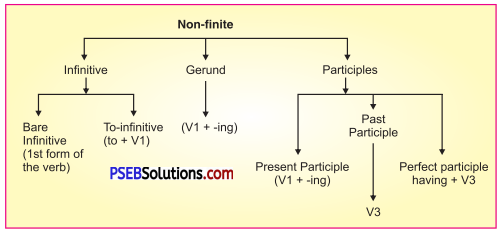
B.1. The Infinitives
The infinitive can further be divided into two categories :
(a) Bare infinitive
(b) To-infinitive
(a) Bare infinitive
Bare Infinitives are also called plain infinitives or infinitives without ‘to’. , Use of Bare infinitives
The bare infinitive is used: with verbs such as ‘bid’, ‘have’, ‘left’, ‘make’
(a) The teacher made the student repeat the lesson.
(b) He bade me write an essay.
(c) He didn’t let me enter the room.

2. with auxiliaries ‘will’, ‘would’, ‘shall’, ‘should’, ‘can’, ‘could’, ‘do’, ‘must’, ‘may, etc.
(a) You can go now.
(b) You shall know your results tomorrow.
3. with auxiliaries ‘neeď and dare’, the bare infinitive is used primarily in interrogative
and negative sentences, for example :
(a) Dare you go into the foresť at night ?
(b) He daren’t touch his sister’s mobile phone.
(c) Need you go home so soon ?
(d) You needn’t come.
4. with expressions like ‘would rather’, ‘rather than’, ‘had better’, etc.
(a) I would rather stay at home.
(b) You had better ask him for money.
(c) I would die rather than beg.
5. It may follow ‘but’ and ‘except
(a) He did nothing but cry.
(b) He does nothing except complain.
6. with questions denoting suggestions or advice and beginning with ‘why’, ‘why not.
(a) Why make such a noise over a small matter?
(b) Why not take your brother with you ?
(b) To-infinitive
Use of To-infinitive
The To-infinitive is used in many sentence constructions, often expressing the purpose of something or someone’s opinion about something.
1. as a noun :
(a) To speak effectively needs a lot of practice. (subject)
(b) To err is human. (infinitive as subject)
(c) To criticize others is an easy job. (subject)
(d) He likes to play cricket. (infinitive as objects)
(e) To play with fire is a very risky game. (subject)
(f) My duty is to serve my country. (as a complement to a linking verb)
(g) It is easier to preach than to practise. (after the dummy subject ‘it’)

2. as adverb to modify verbs and adjectives:
(a) We go to school to learn. (modifies the verb ‘go’)
(b) She’s hard to please. (modifies the adjective ‘hard’)
3. as adjective to qualify nouns:
(a) It was a match to remember (qualifies ‘match’)
4. as object complement
(a) He advised me to keep quiet.
(b) I advised him to accept the offer.
5. too + adjective/adverb + infinitive
(a) He’s too weak to walk.
(b) Mona is too young to understand this.
(c) They worked too slowly to achieve the target.
6. enough + infinitive
(a) He has enough money to pay the bill.
(b) He’s kind enough to help you.
Activity 6.
Pick out infinitives in the following sentences and underline them.
1. I saw him go.
2. He promised to come.
3. To forgive is difficult.
4. I watched her dance.
5. It is bad to cheat your family.
Answer:
1. I saw him go.
2. He promised to come.
3. To forgive is difficult.
4. I watched her dance.
5. It is bad to cheat your family.
Activity 7.
Fill in the blanks with appropriate non-finite forms.
(a) You ought …………….. (get) up earlier.
(b) It is easy ……………… (make) mistakes.
(c) He made me ………………. (repeat) the lessons.
(d) You needn’t ………………. (say) anything.
(e) Would you like ………………. (come) in my car ?
(f) He will be able …………… (swim) very soon.
Answer:
(a) to get
(b) to make
(c) repeat
(d) say
(e) to come
(f) swim.
Activity 8:
Combine the following pairs of sentences into one sentence using too/enough + infinitive.
(a) You are very young. You can’t have a gun.
Answer:
You are too young to have a gun.
(b) He’s very ill. He can’t eat anything.
Answer:
He is too ill to eat anything.
(c) Mickey was very foolish. He told lies to the police.
Answer:
Mickey was foolish enough to tell lies to the police.
(d) The fire isn’t very hot. It won’t boil the kettle.
Answer:
The fire is not hot enough to boil the kettle.
(e) I am rather old. I can’t walk that far.
Answer:
I am too old to walk that far.

B.2. The Gerunds
Gerunds are verb + -ing form used as nouns. They can be used in the following ways :
(a) as a subject
(b) after prepositions
(c) after certain verbs
(d) in noun-compounds
Read the following sentences :
(a) Swimming is a good exercise.
The word ‘swimming’ is formed from the verb ‘swim’ by adding -ing to it. It therefore appears to be a verb. The word ‘swimming’ is the name of an action and is also the subject of the sentence. Hence, it does the work of a noun. The word ‘swimming is like a verb as well as a noun. It is therefore a verb — noun and is called a gerund.

Note : The form of the gerunds and of the present participles are identical. However, Gerunds are verbal nouns and Participles are verbal adjectives.
Examples :
(a) He is fond of riding.– Gerund
(b) Riding along the road, he saw a porcupine. — Present participle
Use of a gerund :
As already mentioned above, a gerund can be used as
(a) the subject of a verb : as
(i) Seeing is believing.
(ii) Collecting stamps is his hobby.
(b) as the object of a transitive verb : as
(i) I enjoy reading poetry.
(ii) i like watching the stars at night.
(c) as object of a preposition : as
(i) She’s fond of dancing
(ii) He was punished for telling a lie.
(d) after certain verbs : the gerund is used after verbs such as given below :
admit, avoid, consider, death, differ, delay, deny, detest, dread, enjoy, excuse, fancy, finish, forgive, imagine, invoke, keep, miss, pardon, postpone, prevent, recollect, resend,risk, stop, suggest, understand, etc.. )

Examples :
(a) He stopped writing as I entered the room.
(b) Please pardon my saying so.
(c) I enjoy watching this game.
Pick out gerunds in the following sentences :
(a) Swimming is a good exercise.
(b) I enjoy sleeping.
(c) Old men enjoy gossiping.
(d) I hate waiting.
(e) Stealing is a crime.
(f) am fond of walking.
(g) I am good at spelling.
(h) We took part in boating.
(i) My sister does not like cooking.
(j) She’s fond of dancing.
Answer:
(a) swimming
(b) sleeping
(c) gossiping
(d) waiting
(e) Stealing
(f) walking
(g) spelling
(h) boating
(i) cooking
(j) dancing.
Fill in the blanks with the correct gerund or infinitive form of the verbs given in the brackets.
(a) He agreed …………… me. (help).
(b) Suresh enjoys ……………. football. (play).
(c) We failed ………….. the train. (catch)
(d) They decided …………… hard. (work)
(e) She loves ……………. to music. (listen)
(f) I am learning how ………….. (drive)
(g) The class wanted …………… for a picnic. (go)
(h) He urged us ……………. faster. (work)
(i) She loves ……………. books. (read)
(j) I am looking forward to …………… you. (meer)
Answer:
(a) to help
(b) playing
(c) to catch
(d) to work
(e) listening
(f) to drive
(g) to go
(h) to work
(i) reading
(j) meet.

Learning to Listen
Activity 10.
You will listen carefully to your teacher. Your teacher will read a passage slowly. Write in your notebook what you hear. Do not make spelling mistakes and put appropriate punctuation marks such as comma, question mark or full stop, where needed. (Refer to Appendix I at page no. 166.)
Answer:
Do it yourself.
Learning to Speak
Activity 11:
Look at the pictures given below. There are 8 differences. Do this activity with your partner. While identifying the differences, you all must speak in English only.
Spot the differences

You may use sentences such as 1 can see a difference here
Answer.
1. I can see a difference here in the time. Left hand side clock shows 8.25 but right hand side clock shows 11.25 O’clock.
A —- B
2. Balls on the window rod —- No balls
3. Handles of the drawer are big —- small
4. Cusion of sofa set — one blue —- all yellow
5. Fruits in tray on table—more —- less
6. Book & sequence design —- different
7. Objects on shelf behind sofa —- different
8. Something kept on drawers —- nothing on drawers.
Learning to Write
Given below is an application written to the Principal of a school asking for exemption from examination. Read it carefully and also look at its format.
Answer:
The Principal
Dev Samaj Senior Secondary School
Jalandhar
Sir
I am a student of Class VIII A of your school. Our bimonthly exams are starting from November 01, 20….. Sir, I always stand first in all the exams. My sister’s wedding is falling on November 05, 20…. .As I am the only helping hand of my father, I can’t take the exam this time. This time, I request you to exempt me from the examination. I shall be very thankful to you.
Thanking you
Yours obediently
XYZ …….
Roll No. 21, VIII A
July 5, 20.

Activity 12.
Write an application to your Principal asking for a School Leaving Certificate in the space given below. You must write.
- your reason for leaving the school
- when you will leave the school
- where you will take admission after leaving the school
Answer:
The Principal
Govt. Senior Secondary School Hamirpur
Sir
I am a student of class VIII of your school. My father has been transferred to XYZ city. He is to report for duty there within three days. All the members of our family are leaving tomorrow. My parents do not wish me to join a hostel. I am sorry to leave your good school, but I am helpless. I shall have to join some school at XYZ city. I have paid all the dues. Kindly issue my school leaving certificate and oblige. I shall be thankful to you for this.
Yours obediently
Om Mehta
VIII-D
March 8,20…..
Learning to Use the Language
Activity 13
| What’s the problem? |
Do you mind if I – |
Go ahead! |
| Is it OK if – |
telling me – |
Thanks! |
| Here you are ! |
Could you turn – |
Can I borrow – |
Conversation 1
Raghav : Yeah?
Gurtej : Hello, ……….. turn the music down, please? It’s one o’clock and I’m trying to sleep.
Raghav : Oh, sorry. Is that okay ?
Gurtej : Yes, ………. Perhaps I can get some sleep now. Good Night!
Answer:
1. could you
2. Thanks.
Conversation 2
Japtej : I’m sorry, leave early today? I’m going to take my dog to see the vet.
Palak : You’re going to take your dog to the vet ? What’s the matter with him ?
Japtej : I don’t know. That’s why I’m going to take him to the vet’s.
Palak : Oh, I see! Sure Thanks for
Answer:
1. Is it ok if I
2. Here you are !
3. telling me.
Conversation 3
Sheenam : Divyam, do you have your mobile phone with you ?
Divyam : Um … yes. Why ?
Sheenam : it, please? I need to make a quick call to my mother.
Divyam : OK,
Answer:
1. Can I borrow
2. go ahead !
Conversation 4
Jyoti : ………… change seats?
Rajneesh : Yes, all right ……. ?
Jyoti : I can’t see because of the sun.
Rajneesh : OK, then. Why don’t you sit there, next to Piyush.
Answer:
1. Do you mind if I
2. What is the problem ?

Activity 14 :
Given below are some polite requests with equally polite responses. Match the questions in Column A with the correct responses in Column B.
Answer:
| S.No. |
Column A |
S.No. |
Column B |
| 1. |
Can I have a glass of juice? |
1. |
Yes, of course! |
| 2. |
Is it alright if I make a phone call? |
2. |
I said that some friends were coming over. |
| 3. |
Could you say that again, please? |
3. |
Well, OK, if it’s a local call. |
| 4. |
Can I speak to you for a moment? |
4. |
Oh sure, The remote’s on the table. |
| 5. |
Do you mind if I look at your books? |
5. |
Well, not really. Why can’t you come? |
| 6. |
Is it OK if I miss the class tomorrow? |
6. |
Of course, there’s some in the fridge. |
| 7. |
Could you move a little, please? |
7. |
You can borrow some if you want. |
| 8. |
Do you mind if I turn the TV up? |
8. |
Yes, sorry. I didn’t realise you wanted to sit down. |
1. Of course, there’s some in the fridge.
2. Well, OK, if it’s a local call.
3. I said that some friends were coming over.
4. Yes, of course !
5. You can borrow some if you want.
6. Well, not really. Why can’t you come ?
7. Yes, sorry. I didn’t realise you wanted to sit down.
8. Oh sure, The remote’s on the table.
Comprehension Of Passages
Read the following passage and answer the questions given below each :
(1) Long time ago, a rich farmer summoned his three lazy sons. Harry, Raman and Sandeep and said, “I have grown old. I have decided to divide my property among you. As you all know, I own three fields and three houses. Each one of you will get a field and a house only if you prove that you are worth it”. The three sons were surprised. “What do you mean, father ?” cried they. The farmer said, “These fields and houses are the fruits of my hard work. All the three of you are very lazy. I want the three of you to find some work. Return to me after six months with your earnings. I will decide if you are worthy of acquiring my hard-earned property.” The three brothers set out in search of work, On the way, they sat down under a banyan tree to rest.
1. How could the sons gain their father’s property ?
पुत्र अपने पिता की संपत्ति कैसे प्राप्त कर सकते थे ?
2. Where did they take rest ?
उन्होंने आराम कहां किया?
3. Choose true and false statements and write them in your answer-book :
(a) All the three sons were hard-working.
(b) The sons were given six months to prove their worth.

4. Complete the following sentences according to the meaning of the passage :
(a) Each son will get …………
(b) The three sons set out in ……… of work
Match the words with their meanings :
| (i) summoned |
called |
| (ii) acquire |
gain |
|
put in jail |
Answer:
1. The sons could gain it by proving themselves worth it.
2. They took rest under a banyan tree.
3.
(a) False
(b) True.
4.
(a) Each son will get a field and a house.
(b) The three sons set out in search of work.
Or
(i) summoned — called
(ii) acquire — gain
(2) Then the old sage said, “Promise me that if ever a poor man asks you for a cup of milk, you will not deny him.”
“It’s a gendeman’s promise”, said the lad “and whatsoever he wishes for milk, butter, curd, sweets, I will never deny.” The old sage smiled, “Do not break your promise.”
“I will not”, assured Harry.
The other two brothers continued on their way with the old.sage. They went on till they came to a stream. The old sage looked sad and worried. “Oh! There’s no boat. How will I cross the stream ?” Raman said very kindly. “Don’t worry! I’ll help you. I’ll carry you on my back.” After crossing the river, the three of them sat down for some rest.
The sage thanked Raman and said, “God bless you, son! Here is a gift for you.”
Raman was delighted. The sage gave him a piece of stick. Raman was surprised. “What is this ?” “It is a magic stick. It will grant you two wishes. Ask now.”
1. What was Harry’s gendeman promise ?
हैरी का सज्जन पुरुष वाला वचन क्या था?
2. Who gave a gift to Raman ? What was it ?
रमन को उपहार किसने दिया? यह क्या या?
3. Choose true and false statements and write them in your answer-book :
(a) The sage crossed the river with the help of a boat.
(b) Harry assured the sage that he would not break his promise.

4. Complete the following sentences according to the meaning of the passage :
(a) Raman offered to carry the sage across
(b) The old sage looked
Or
Match the words with their meanings :
| (i) delighted |
refuse |
| (ii) deny |
happy/glad |
|
wondered |
Answer:
1. Harry’s promise was that he would never deny anything to the needy.
2. The sage gave a gift to Raman. It was a piece of magic stick.
3.
(a) False
(b) True.
4.
(a) Raman offered to carry the sage across the river.
(b) The old sage looked sad and worried.
Or
(i) delighted — happy/glad
(ii) deny — refuse.
(3) Sandeep moved on with the old sage. When they came to a desert, they sat down for some rest. The old sage said to Sandeep, “I know you are very tired but I’m very thirsty. Please get me some water”.
“Don’t worry! Please rest here. I’ll find some water for you.” Sandeep set out to find water for the old man. He returned after an hour with some water. The old sage drank the water and blessed Sandeep, “God bless you, son ! Here’s a gift for you.”
Sandeep was delighted. The sage gave him a piece of rope. Sandeep became very happy. He knew he was going to be rewarded. The old sage smiled and said, “It’s a magic rope. It will grant you two wishes. Ask now.”
Sandeep was delighted, “I want a big house.” “Granted.”
A beautiful house appeared.
“What’s your second wish ?” added the sage.
“A field !”, said Harry excitedly. “Granted !”
1. Who brought water for the sage ?
साधु के लिए पानी कौन लाया?
2. How many wishes could the magic rope grant ?
जादुई रस्सी कितनी इच्छाएँ पूरी कर सकती थी?
3. Choose true and false statements and write them in your answer-book :
(a) On the way the sage felt hungry.
(b) Sandeep asked for a beautiful house for his first wish.
4. Complete the following sentences according to the meaning of the passage :
(a) The sage gave Sandeep ……… as a gift.
(b) Sandeep became happy because he was going to be ……….
Or
Write the meanings of the following words in English : (any two) excitedly, grant, wish
Answer:
1. Sandeep brought water for the sage.
2. The magic rope could grant two wishes.
3.
(a) False
(b) True.
4. (a) The sage gave Sandeep a magic rope as a gift.
(b) Sandeep became happy because he was going to be rewarded.
Or
eagerly, fulfil, desire.

Use Of Words And Phrases in Sentences
1. Deny – He denied me food.
2. Wish – His wish came true.
3. Grant – All his wishes were granted.
4. Summoned – The king summoned his minister to his court.
5. Approached – The beggar approached the langar house for food.
6. Worth – You are not worth this big house.
7. Snatched – All his awards were snatched from him.
8. Appeared – All of a sudden a beautiful girl appeared from no where.
9. Word – He did not keep his word.
10. Delighted – He was delighted to- win the race.
Word-Meanings
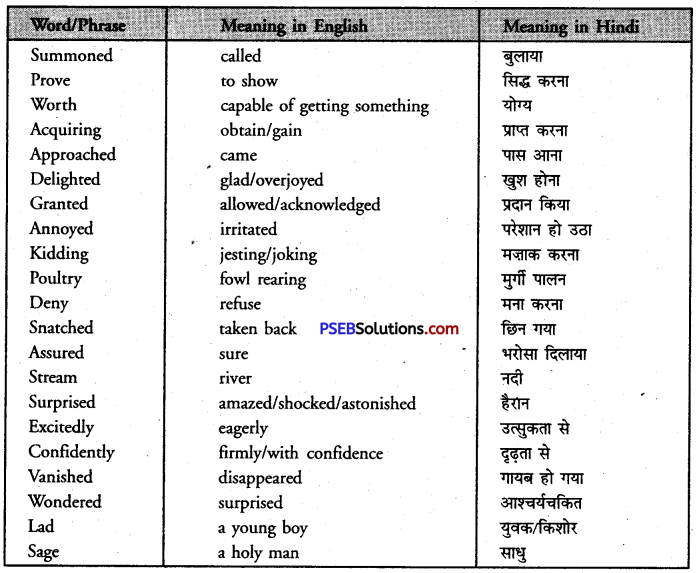
The Old Sage and the Brothers Summary in Hindi
Long time ago…..knew no bound.
बहुत समय पहले एक अमीर किसान ने अपने तीन आलसी पुत्रों-हैरी (Harry), रमन तथा संदीप को बुलाया और कहा, “मैं बूढ़ा हो चुका हूँ। मैंने अपनी सम्पत्ति को तुम्हारे बीच में बांटने का निर्णय लिया है। जैसा कि तुम जानते हो मेरे पास तीन खेत और तीन घर हैं। तुम में से प्रत्येक को एक खेत और एक घर मिलेगा, यदि तुम यह सिद्ध करोगे कि तुम उसके योग्य हो।” तीनों पुत्र हैरान थे। वे चिल्लाए, “पिता जी, आप का क्या अर्थ है ?” किसान ने कहा, “ये खेत और घर मेरी कड़ी मेहनत का फल हैं। तुम तीनों बड़े ही आलसी हो। मैं चाहता हूँ कि तुम तीनों कोई काम ढूंढो।
ठछः मास के बाद अपनी आमदनी लेकर मेरे पास वापिस आओ। मैं निणय करूंगा कि क्या तुम मेरे द्वारा कड़ी मेहनत से अर्जित सम्पत्ति पाने के योग्य हो।” तीनों भाई काम की तलाश में निकल पड़े। रास्ते में वे बरगद के एक वृक्ष के नीचे आराम करने के लिए बैठ गए। जब वे खाना खा रहे थे तभी एक वृद्ध साधु उनके पास आया।
उसने कहा, “मैं भूखा हूं। क्या तुम मुझे खाने के लिए कुछ दे सकते हो ?” हैरी (Harry) ने उसे एक चपाती दे दी। साधु ने खुशी-खुशी उसे खा लिया और बोला, “पुत्र ! ईश्वर तुम्हारा भला करे। तुम्हारे लिए एक उपहार है।” हैरी खुश हो गया। साधु ने उसे कपड़े का एक टुकड़ा दिया।हैरी चिढ़ कर बोला, “यह क्या है ? क्या तुम मेरे साथ मज़ाक कर रहे हो ?”
साधु मुस्कराया और बोला, “यह एक जादुई कपड़ा है। यह तुम्हारी दो इच्छाएं पूरी करेगा। अब मांगो।” हैरी अत्यधिक खुश होकर बोला, “मुझे एक बड़ा घर चाहिए।” “प्रदान किया !” एक सुन्दर घर प्रकट हो गया। साधु ने पूछा, “तुम्हारी दूसरी इच्छा क्या है ?” हैरी ने उत्साह से कहा, “दस गाय।” “दे दी।” दस गाय न जाने कहां से प्रकट हो गईं। हैरी की खुशी का कोई ठिकाना न रहा।
Then the old sage………………Raman confidently.
तब वृद्ध साधु ने कहा, “मुझे वचन दो कि जब कभी भी कोई गरीब आदमी तुमसे एक कप दूध मांगेगा तो तुम इन्कार नहीं करोगे।” युवक ने कहा, “यह एक सज्जन पुरुष का वचन है। वह दूध, मक्खन, दही, मिठाई में से किसी चीज़ की भी इच्छा प्रकट करेगा, मैं इंकार नहीं करूंगा।” वृद्ध साधु मुस्कराया, “अपना वचन मत तोड़ना।” हैरी ने भरोसा दिलाया, “मैं नहीं तोडंगा।”
दूसरे दो भाई वृद्ध साधु के साथ आगे बढ़ गए। वे तब तक चलते रहे जब तक कि वे एक नदी पर नहीं पहुंच गए। वृद्ध साधु उदास और चिंतित दिखाई देने लगा। “ओह ! यहां तो कोई नाव नहीं है। मैं नदी कैसे पार करूंगा ?” रमन ने उदारता से कहा, “चिंता मत करो। मैं तुम्हारी मदद करूंगा। मैं आपको अपनी पीठ पर ले जाऊंगा।” नदी पार करने के पश्चात् वे तीनों आराम करने के लिए बैठ गए।
साधु ने रमन का धन्यवाद किया और कहा, “पुत्र! ईश्वर तुम्हारा भला करे। तुम्हारे लिए एक उपहार है।” रमन खुश हो गया। साधु ने उसे छड़ी का एक टुकड़ा दिया। रमन हैरान रह गया। “यह क्या है ?” साधु ने कहा, “यह एक जादुई छड़ी है। यह तुम्हारी दो इच्छाएं पूरी करेगी। अब मांगो।” रमन खुश हो गया। उसने कहा, “मुझे एक बड़ा घर चाहिए।” “प्रदान किया !” एक सुन्दर घर प्रकट हो गया। साधु ने आगे कहा, “तुम्हारी दूसरी इच्छा क्या है ?” रमन ने उत्सुकता से कहा, “एक मुर्गी फ़ार्म।” “प्रदान किया !” एक मुर्गी पालन फ़ार्म न जाने कहां से प्रकट हो गया।
रमन की खुशी का कोई ठिकाना न रहा। तब वृद्ध साधु ने कहा, “मुझे वचन दो कि जब कभी भी कोई गरीब आदमी तुमसे एक अंडा मांगेगा तो तुम मना नहीं करोगे।”

युवक ने कहा, “यह एक सज्जन पुरुष का वचन है और वह अंडे, आमलेट, अंडे का हलवा में से किसी भी चीज़ की इच्छा प्रकट करेगा, मैं इंकार नहीं करूंगा।” वृद्ध साधु ने मुस्कराते हुए कहा, “अपना वचन मत तोड़ना।” रमन ने दृढ़ता से कहा, “मैं ऐसा नहीं करूंगा।”
Sandeep moved on… ………..”Granted!”
संदीप वृद्ध साधु के साथ चलता रहा। जब वे एक मरुस्थल में पहुँचे तो नीचे बैठ कर आराम करने लगे। वृद्ध साधु ने संदीप से कहा, “मैं जानता हूँ कि तुम थके हुए हो परन्तु मुझे बहुत प्यास लगी है। कृपया पानी ले आओ।”
“आप चिंता न करें। कृपया यहां आराम करें। मैं आपके लिए पानी की तलाश करता हूं।” संदीप वृद्ध साधु के लिए पानी तलाशने के लिए निकल पड़ा। वह एक घण्टे के बाद पानी लेकर लौटा। वृद्ध साधु ने पानी पिया और संदीप को आशीर्वाद दिया, “पुत्र, ईश्वर तुम्हारा भला करे! तुम्हारे लिए एक उपहार है।”
संदीप प्रसन्न हो गया। साधु ने उसे रस्सी का एक टुकड़ा दिया। संदीप खुश हो गया। वह जानता था कि उसे उपहार मिलने वाला है। वृद्ध साधु मुस्कराया और कहा, “यह एक जादुई रस्सी है। यह तुम्हारी दो इच्छाएं पूरी करेगी। अब मांगो।”
संदीप प्रसन्न था, “मुझे एक बड़ा घर चाहिए।” “प्रदान किया।” एक सुन्दर घर प्रकट हो गया। साधु ने आगे कहा, “तुम्हारी दूसरी इच्छा क्या है ? ” संदीप ने उत्सुकता से कहा, “एक खेत!” “प्रदान किया!” एक खेत न जाने कहां से प्रकट हो गया। संदीप की खुशी का ठिकाना न रहा।
तब वृद्ध साधु ने कहा, “मुझे वचन दो कि जब कभी भी कोई गरीब आदमी तुमसे खाने के लिए कुछ मांगेगा तो तुम इंकार नहीं करोगे।”
युवक ने कहा, “यह एक सज्जन पुरुष का वचन है। वह चावल, गेहूं, सब्जियां, फल में से किसी भी चीज़ की इच्छा प्रकट करेगा, मैं इंकार नहीं करूंगा।” वृद्ध साधु मुस्कराया, अपना वचन मत तोड़ना।”
संदीप ने वचन देते हुए कहा, “मैं ऐसा नहीं करूंगा।” बूढ़ा साधु अपनी यात्रा पर निकल पड़ा। कुछ दिनों के बाद संदीप ने अपने भाइयों से मिलने का निश्चय किया क्योंकि उसे उनकी याद आ रही थी। घर, गायें, मुर्गी फ़ार्म और उसके भाई सब गायब हो चुके थे। वह उन्हें ढूंढ़ नहीं सका। जब वह वहां खड़ा था आश्चर्यचकित था, उसने साधु को अपनी ओर आते देखा। साधु ने उसे बताया, “तुम्हारे भाइयों ने अपना वचन नहीं निभाया। उन्होंने ग़रीबों और जरूरतमंदों की मदद नहीं की। इसलिए जो कुछ भी उन्हें दिया गया था, छिन गया। तुम अपने वचन पर खरे उतरे। इसलिए जब तक तुम अपने वचन को याद रखोगे, आनंद करते रहोगे।
Retranslation From English to Hindi
1. A rich farmer summoned his three lazy sons.
एक अमीर किसान ने अपने तीन आलसी पुत्रों को बुलाया।
2. I have grown old.
मैं बूढ़ा हो चुका हूँ।
3. I own three fields and three houses.
मेरे पास तीन खेत और तीन घर हैं।
4. The three sons were surprised.
तीनों पुत्र हैरान थे।
5. I want three of you to find some work.
मैं चाहता हूँ कि तुम तीनों कोई काम ढूंढ़ो।
6. The three brothers set out in search of work.
तीनों भाई काम की तलाश में निकल पड़े।
7. The sage ate it happily..
साधु ने खुशी-खुशी उसे खा लिया।
8. The sage gave him a piece of cloth.
साधु ने उसे कपड़े का एक टुकड़ा दिया।
9. It’s a magic cloth.
यह एक जादुई कपड़ा है।
10. I want a big house.
मुझे एक बड़ा घर चाहिए।
11. The old sage looked sad and worried.
वृद्ध साधु उदास और चिंतित दिखाई देने दिया।
12. I’ll carry you on my back.
मैं आपको अपनी पीठ पर ले जाऊंगा।
13. Here is a gift for you.
तुम्हारे लिए एक उपहार है।
14. A poultry farm appeared out of nowhere
एक मुर्गी पालन फ़ार्म न जाने कहां से प्रकट हो गया।
15. I know you are tired.
मैं जानता हूँ कि तुम थके हुए हो।
16. It’s a gentleman’s promise.
यह एक सज्जन पुरुष का वचन है।

17. The old sage set out on his journey.
बूढ़ा साधु अपनी यात्रा पर निकल पड़ा।
18. You were as good as your word.
तुम अपने वचन पर खरे उतरे।
![]()
![]()
![]()

